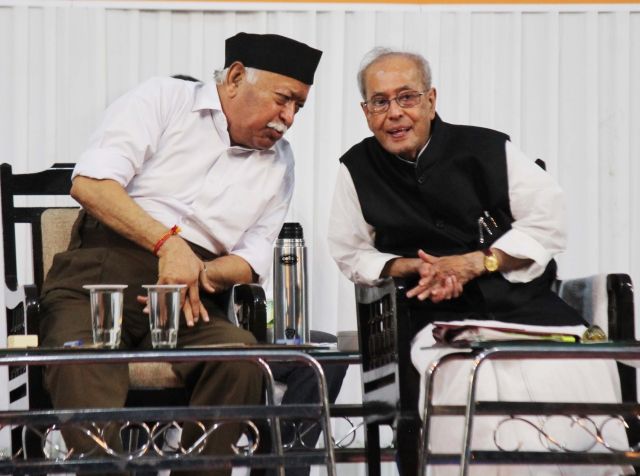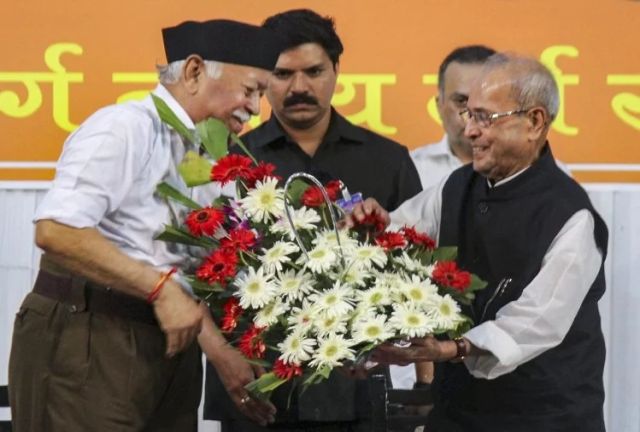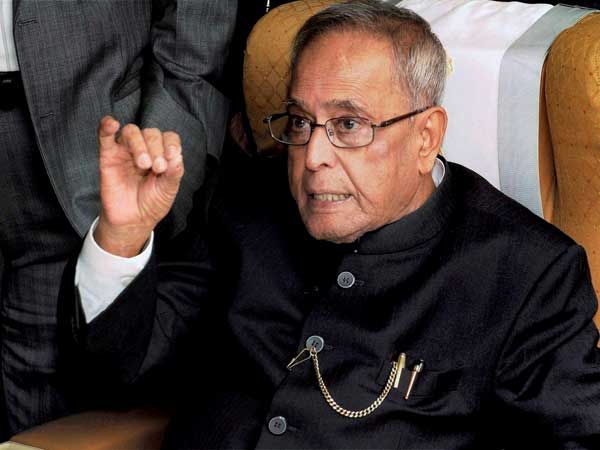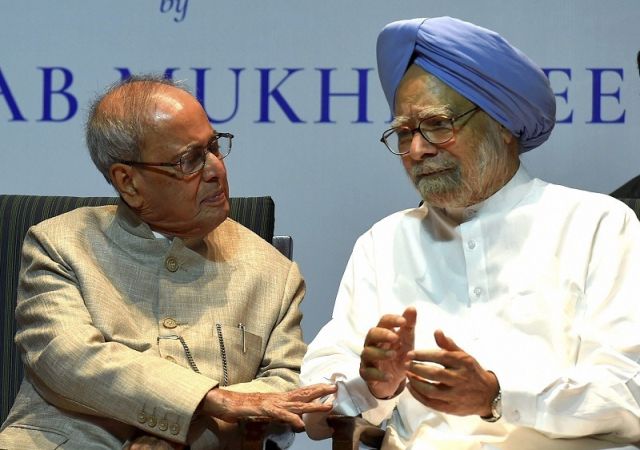
by admin | May 25, 2021 | Opinions
 By Tarun Basu,
By Tarun Basu,
The images from Nagpur were, in the words of a Congressman, hard to digest. Here was Pranab Mukherjee, a dyed-in-the-wool secularist, who had spent a lifetime in the Congress party, then became the President of India with the responsibility of upholding its Constitution, sharing the platform with, and enjoying the hospitality of, a person — and the organisation he heads, the Rashtriya Swayamsevak Sangh (RSS) — espousing values and ideals that are the very antithesis of all he stood and strove for his entire life.
“You were part of the government that banned the RSS in 1975 and again in 1992. Don’t you think you should tell us what was evil about RSS then that it has become virtuous now?” asked a middle-level Congress leader of Mukherjee after his controversy-tinged visit to the headquarters of the Hindu-first outfit that is the ideological mentor of the ruling Bharatiya Janata Party (BJP) of Prime Minister Narendra Modi.
Many in the Congress party, including his own daughter, questioned the wisdom of the former head of state and elder statesman accepting an invitation from the organisation that has been a bete noire to the left-liberal-secular establishment. Not just the committed, but even concerned citizens, have been voicing their anguish at the creeping climate of hate and prejudice in the country and blamed the ideology of the RSS and its affiliated Sangh Parivar outfits for the systemic attacks on minorities and suppression of the voice of socially oppressed groups. Many have voiced fears that if such venom was allowed to spread, it might end up tearing up the multireligious, multiethnic and multicultural social fabric of India that makes the country so unique.
“Today we are confronted with a politics of hate that has swept large parts of our country….. Muslims live in fear of the shape of the next round of attacks, even as the rights of Dalits and Adivasis enshrined in the Constitution are being questioned,” read the flier distributed at the #NotInMyName protests across the country in April after the brutal violations of young girls, allegedly by elements with affiliations to Hindu nationalist groups.
In this atmosphere of growing polarisation stepped in the 83-year-old Mukherjee, bearding the lion in his own den as it were, ignoring appeals by some old cabinet and party colleagues. In a speech that was followed nationally on live television, Mukherjee said that the “soul of India resides in pluralism and tolerance” and “secularism and inclusion are a matter of faith for us”. He reminded the RSS rank and file who preached a Hindu supremacist ideology and whose founder considered Muslims and Christians as “invaders” that “the multiplicity of culture, faith and language is what makes India special” and “any attempt at defining our nationhood in terms of dogmas and identities of religion, region, hatred and intolerance will only lead to dilution of national identity”.
Was Mukherjee wrong in going to Nagpur, in breach of the beliefs and values he is known to have held dear all through his half-a-century-long political career? A peek into his thinking was available in his address in which he expressed anguish over how “manifestations of rage” were tearing apart the national fabric. He said a “dialogue is necessary not only to balance the competing interests but also to reconcile them… only through a dialogue can we develop the understanding to solve complex problems without an unhealthy strife within our polity”.
Dialogue and accommodation are the cornerstones of democratic functioning and their absence have often sounded the death knell of democracy. In the celebrated book “How Democracies Die”, Harvard professors Steven Levitsky and Daniel Ziblatt talk about how “extreme partisan division” in American democracy today — following the norm-breaking tenure of President Donald Trump — was being fuelled not just by policy differences between the Republicans and Democrats “but by deeper sources of resentment, including racial and religious differences” and was eroding the “guardrails of democracy”.
India today stands similarly at a crossroads, unprecedented perhaps in its 71-year history. As the national discourse becomes heated by the day, with a permissive social media often fanning the division and hatred between the two extreme partisan ideologies, the growing slugfest and the low level of the debate is leading to a gradual disillusionment with democracy among ordinary citizens, particularly the youth, who yearn for change and progress.
With the country headed towards what could be one of the bitterest elections in recent history, not only between sworn political rivals but between ideologies that are fundamentally at odds with each other in their national outlook and their very definition of who is an Indian, the partisan polemics over every issue and policy of national concern is eroding India’s fundamental unity. If India, an exemplar of democracy, were to fragment on religious or caste lines, analysts say it could have a devastating effect on the region and the rest of the world.
And that is perhaps why Mukherjee felt he had to step in to bridge the deepening chasm in the national discourse and plead for dialogue. Whether the canny former politician did it with any eye on the next elections — in politics, as Franklin Roosevelt said, nothing happens by accident — may not be known immediately, but to denounce his visit as self-serving and a betrayal is to lose sight of the fundamental tenets of democracy which the world has come to value in India.
“Messy as it may be, India’s political system may be credited with great achievements,” The Economist said in one of its recent columns referring to a Pew Global survey which found Indians to be less enthusiastic about democracy and more drawn towards having a strong leader or military rule than citizens of any other democracy surveyed. “It has helped hold a huge and almost impossibly diverse country together. It has kept the army out of power. And it has upheld civic freedoms that, for all their fragility, remain the envy of many of India’s neighbours.”
(The author is a veteran mediaperson. The views expressed are personal. He can be contacted at tarun.basu@spsindia.in)
—IANS

by admin | May 25, 2021 | Opinions
 By Amulya Ganguli,
By Amulya Ganguli,
It was an evening of pious homilies at the Rashtriya Swayamsevak Sangh (RSS) headquarters in Nagpur where former President and now citizen Pranab Mukherjee was the guest of honour at a valedictory function.
While he dwelt on how pluralism and tolerance constituted the “soul” of India, the RSS sarsanghchalak, Mohan Bhagwat, expounded on the organization’s vision which extended well beyond the Hindu samaj (society) with which it is usually associated to encompass all the children of Bharat Mata (Mother India).
There was no ‘paraya’ (outsider) in his view, nor any ‘dushman’ (enemy). Observers noted that there was no mention of a Hindu ‘rashtra’ (nation), the leitmotif of the RSS, in Bhagwat’s speech.
Was this a concession to a diehard former Congressman Mukherjee’s secular sensitivities or has there been a change of heart on the part of the RSS ? If the latter, it will mark a seminal change in the outlook of the 93-year-old organization and carries the potential of a political and social upheaval.
Arguably, Bhagwat’s claim about Mother India’s parentage of all Indians, irrespective of caste or creed, is on a par with Narendra Modi’s “sabka saath, sabka vikas” (For all, development for all) mantra. It is also the essence of the multicultural, multireligious secular concept, which is routinely derided as “sickular” by the saffron trolls.
However, just as the agenda of development for all hasn’t led to any marked diminution in the “darkness, fear and mistrust”, as Mukherjee said, in the minds of the minorities, as testified by, among others, former vice-president Hamid Ansari and the archbishop of Delhi, Anil Couto, it remains to be seen whether Bhagwat’s outreach to everyone leads to Muslims not being called “Babur ki aulad” (children of the Mughal emperor, Babur) by Hindutva activists or to Christian missionaries not being accused of a relentless engagement with conversions.
How difficult a transformation in the attitudes of the average RSS supporter would be might be gauged from the way a saffron commentator on television latched on to Mukherjee’s reference to Muslim “invaders” and British colonisers to note how the former President’s views differed from the benignity of the secularists in associating Muslims with biryani and the British with cakes.
Notwithstanding the time it might take for the Hindu Right and the secular camp to evolve some kind of a commonality, it goes without saying that the initiative taken by the RSS to invite a person from the opposing camp, so to say, and also by the latter’s acceptance of the invitation bode well for the country.
It will be a matter of great relief all around if last Thursday’s interaction in Nagpur leads to a reduction in the present atmosphere of bitter polarization. The process might be a long-drawn one considering how for decades the two lines of thought of a composite culture (of Hindus, Muslims and others) on one hand and of cultural nationalism (one people, one nation, one culture) on the other have battled one another.
But the endeavour towards a consensus will be worthwhile if only it dissuades an M.P. like Vinay Katiyar of the Bharatiya Janata Party (BJP) from saying that Muslims have no right to live in India or for an arrested suspect to justify the journalist Gauri Lankesh’s murder on the grounds that she was anti-Hindu.
The test of the Nagpur bonhomie, therefore, will be to see whether there has been a mollifying impact on the Hindutva hotheads.
It has to be remembered, however, that although the RSS is the paterfamilias of the saffron brotherhood, there are other organizations – the Vishwa Hindu Parishad (VHP) and the Bajrang Dal (which are a part of the Sangh Parivar) and Hindu Mahasabha (which is not) as well as others – which are ardent votaries of a Hindu ‘rashtra’ by, of and for Hindus where the minorities have to live as second-class citizens.
It will take more than two speeches in Nagpur, therefore, to save the pluralist “soul” of India.
What is more, since fundamentalism begets fundamentalism, the stridency of the Hindu version even if only by outliers like the VHP can encourage the bigots among Muslims or the Khalistanis among Sikhs to up the ante at the instigation of Pakistan.
Another fallout of the Nagpur interaction will be for the Left-Liberals to interpret a toning down of the saffron rhetoric as victory for the secular camp and a defeat for the Parivar. The Congress is already gloating over how Mukherjee held up the “mirror of truth” to the RSS although the party was at first extremely nervous about what their old stalwart would say on entering enemy territory.
Now that his history lessons were seen to be in line with the authorized version favoured by the Congress as opposed to the saffron interpretations, the party has heaved a sigh of relief. But the battle of wits is likely to continue.
(Amulya Ganguli is a political analyst. The views expressed are personal. He can be reached at amulyaganguli@gmail.com)
—IANS

by admin | May 25, 2021 | News, Politics
 New Delhi : Hours after Congress leaders had slammed former President Pranab Mukherjee for attending an RSS event, the party on Thursday praised him for showing “mirror of truth” to the Sangh by reminding it of Indias pluralism, tolerance, secularism and inclusiveness as an article of faith and soul of the country.
New Delhi : Hours after Congress leaders had slammed former President Pranab Mukherjee for attending an RSS event, the party on Thursday praised him for showing “mirror of truth” to the Sangh by reminding it of Indias pluralism, tolerance, secularism and inclusiveness as an article of faith and soul of the country.
The party also said Mukherjee reminded the Prime Minister Narendra Modi of his ‘Rajdharma’ and that “Indian nationalism is constitutional patriotism”.
Congress spokesperson Randeep Singh Surjewala also said in a statement that Mukherjee’s visit to RSS headquarters had caused wide ranging discussion, comment, concern and even consternation amongst a large section of Indians, who have an innate belief in foundational values of democracy, pluralism, and diversity.
His statement came soon after Mukherjee had delivered his nearly 30-minute address at the RSS headquarters during its third year annual training camp. Earlier, several Congress leaders including Mukherjee’s daughter Sharmistha Mukherjee, Ahmed Patel and Anand Sharma had slammed him for attending a Rashtriya Swayamsevak Sangh event in Nagpur.
“Pranab Mukherjee has shown the mirror of truth to the RSS at RSS headquarters in Nagpur by reminding them of India’s pluralism, tolerance, secularism and inclusiveness as an article of faith and soul of the country,” said Surjewala.
“He particularly highlighted the imperative need of freeing the public discourse from all forms of violence – physical and verbal, besides putting compassion, harmony and non-violence as the centre stage of our public life,” he added.
Surjewala said Mukherjee also reminded the Modi government of following ‘Rajdharma’, founded upon our diversity, non-violence, multiculturalism and assimilation of ideas, particularly that ‘happiness of people is the happiness of ruler, their welfare is his welfare’.
“Indicating the unchecked exercise of authority and attack on institutions in garb of a self-professed definition of ‘pseudo nationalism’, he reminded the RSS as also the prime minister that Indian nationalism is constitutional patriotism,” he added.
Noting that as Indians and as Congressmen, they encourage and believe in the democratic dialogue and recognise the tight and sanctity of dialogue across different thought processes, Surjewala asked: “Simple issue to understand, however, is – dialogue is possible in democratic order, with an open mind and willingness to change, accept and adapt to the other person’s point of view,”
“Is RSS ready to listen? Is RSS ready to change? Is RSS ready to admit its mistakes – both of thought and action? Is RSS ready to adapt to India’s foundational values of pluralism, tolerance, non-violence, secularism and diversity?
“Is RSS ready to give up its prejudice vis-a-vis women, dalits, backwards, minorities and the deprived? Is RSS ready to accept scientific temper and rationality? Is RSS ready to give up its inherent character of subjugation, domination and violence?” he asked.
Congress also wanted RSS to answer if “merely inviting the former President to an event will give it the much elusive social and political sanctity”.
—IANS

by admin | May 25, 2021 | News, Politics
 Nagpur : As the country wonders what former President Pranab Mukherjee might say at Rashtriya Swayamsevak Sangh (RSS) headquarters here on Thursday, his last speech as President in 2017 reflects the thoughts and concerns that had engaged him throughout his over five-decade-long political career.
Nagpur : As the country wonders what former President Pranab Mukherjee might say at Rashtriya Swayamsevak Sangh (RSS) headquarters here on Thursday, his last speech as President in 2017 reflects the thoughts and concerns that had engaged him throughout his over five-decade-long political career.
Unlike his 2012 speech when he took over as President in which he made a passing reference, pluralism and tolerance dominated the 2017 address.
“I want to share with you some truths that I have internalized in this period. The soul of India resides in pluralism and tolerance. India is not just a geographical entity. It carries a history of ideas, philosophy, intellect, industrial genius, craft, innovation and experience. Plurality of our society has come about through assimilation of ideas over centuries.
“The multiplicity in culture, faith and language is what makes India special. We derive our strength from tolerance. It has been part of our collective consciousness for centuries. There are divergent strands in public discourse. We may argue, we may agree or we may not agree.
“But we cannot deny the essential prevalence of multiplicity of opinion. Otherwise, a fundamental character of our thought process will wither away,” said the lifelong Congressman on the last day of his career.
Mukherjee, who has been critical of the RSS, is set to address its activists in Nagpur on Thursday. This will be his first speech from the RSS platform.
Accepting an invitation from the Hindutva group has sparked controversy with some of his former Congress colleagues and Left leaders expressing their reservations over his participation in the RSS meeting.
However, what he is going to speak about at the Nagpur gathering remains a guess. He has said whatever he has to speak would be only known when he addresses the meeting.
In his last speech as the President, Mukherjee had expressd his concern about increasing violence and how darkness, fear and mistrust was at the heart of this violence. Power of non-violence has to be resurrected to build a caring society to ensure participation of all sections of the people, he said.
While pluralism along with environment and inclusion engaged Mukherjee last year as he readied to hang up his boots after a very successful career, his first speech as President in 2012 was markedly different and focussed mainly on poverty, terrorism and corruption. He talked on education both the times.
The first topic Mukherjee touched in his 2012 speech was poverty after making the same overarching statement on basic fundamentals for a modern nation – democracy, secularism and equality. Real development is when the poorest feel they are part of the narrative of rising India, he said.
“There is no humiliation more abusive than hunger. Trickle-down theories do not address the legitimate aspirations of the poor. We must lift those at the bottom so that poverty is erased from the dictionary of modern India.”
However, then, too, Mukherjee’s faith in secularism is reflected in the solitary line on the topic when he said: “Our social harmony is the sublime co-existence of temple, mosque, church, gurudwara and synagogue; they are symbols of our unity in diversity.”
—IANS

by admin | May 25, 2021 | News, Politics
 New Delhi : Former President Pranab Mukherjee expected to be chosen as Prime Minister on two occasions — first in 2004 when the United Progressive Alliance (UPA) came to power, and later in 2012 ahead of the Presidential election, he writes in his latest book “Coalition Years: 1996-2012”.
New Delhi : Former President Pranab Mukherjee expected to be chosen as Prime Minister on two occasions — first in 2004 when the United Progressive Alliance (UPA) came to power, and later in 2012 ahead of the Presidential election, he writes in his latest book “Coalition Years: 1996-2012”.
Mukherjee, a veteran Congress leader, also says that after Sonia Gandhi named Manmohan Singh as her choice for Prime Minister, he was actually reluctant to join the government as a cabinet minister under Singh, who had been his junior when he was Finance Minister under Indira Gandhi.
However, he rubbishes the perception that Manmohan Singh was an “accidental Prime Minister”.
“A strong nationalist, a man of courage and conviction, Manmohan Singh was certainly not an ‘accidental Prime Minister’. I am convinced that the future will judge Manmohan Singh in a different light as (former Prime Minister) P.V. (Narasimha Rao) is assessed today,” Mukherjee says.
After Sonia Gandhi declined the UPA leaders’ proposal to become Prime Minister on May 18, 2004, “there was intense speculation in the party and the media about her choice”, Mukherjee writes.
“Within the Congress party, the consensus was that the incumbent must be a political leader with experience in party affairs and administration… The prevalent expectation was that I would be the next choice for Prime Minister after Sonia Gandhi declined,” the Congress stalwart writes.
He says that this expectation was possibly based of the fact that “I had extensive experience in government while Singh’s vast experience was as a civil servant with five years as a reformist Finance Minister”.
Finally, Sonia Gandhi named Manmohan Singh as her choice and he accepted this.
“Some media commentators reported that I would not join the government because I could not work under Manmohan Singh, who had been my junior when I was the Finance Minister. The fact was that I was reluctant to join the government, and informed Sonia Gandhi accordingly,” Mukherjee says.
Speaking at the release of the book recently, Manmohan Singh said Mukherjee had every reason to feel that he was better qualified than him for the Prime Minister’s post.
He also said that contrary to what people may say or write, the two had no serious differences or friction on any matter during the UPA era.
Mukherjee elaborates that once he joined the government at Sonia Gandhi’s insistence, he enjoyed good rapport with Manmohan Singh who “seemed to depend” on him.
“She (Sonia Gandhi) insisted that I should join the government since I would be vital to its functioning and also be of support to Dr. Singh. As it turned out, Dr. Singh would talk to me on all important issues and seemed to depend on me. We shared a good working relationship,” Mukherjee says.
The second occasion when Mukherjee expected he would be asked to head the government came just ahead of his nomination as the presidential candidate.
After a meeting with Sonia Gandhi on June 2, 2012, when the Congress President discussed with him probable presidential candidates — including him — Mukherjee “returned with a vague impression that she (Sonia Gandhi) might wish to consider Manmohan Singh as the UPA presidential nominee”.
“I thought that if she selected Singh for the presidential office, she may choose me as the Prime Minister. I had heard that she had given this formulation a serious thought while on a holiday in the hills,” he writes.
—IANS





